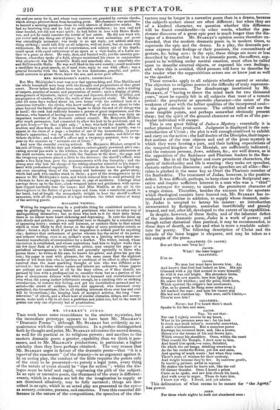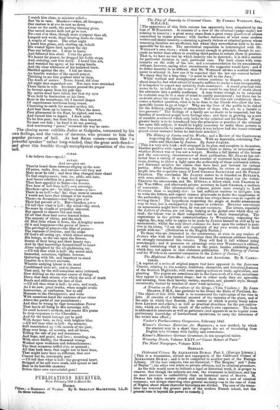MR. STARKEY'S JUDAS.
Tuts work bears some resemblance to the ancient mysteries, but the immediate prototype appears to have been Mr. MuLstetes " Dramatic Poems" ; although Mr. STARKEY has evidently an ac- quaintance with the older compositions. In a preface distinguished both by thought and point, Mr. STARKEY advocates the sacred drama, as well for its poetical as its religious powers ; and ascribes to the modern dramatic poem a greater, capability than we think it pos- sesses, and to Mr. MuxstAtes productions, in particular, a higher celebrity than they have perhaps obtained. The very reason that Mr. STARKEY urges in favour of the dramatic poem—that " it is a report of the enactment " (of the drama)—ia an argument against it. In an acting play, the conduct of the fable requires the points only of the story to be presented—to parody a legal term, every thing of the nature of event should be " ripe for action " ; whilst the dia- logue must be brief and rapid, expressing the pith of the subject. In an epic or narrative poem, the thatment of the story is different : events, which in a drama are left for the imagination to supply or ate dismissed allusively, may be fully narrated ; things are des- cribed in an epic, which in an acted play are presented to the eye— as scenery, costume, persons, and emotions. From this essential dif- ference in the nature of the compositions, the speeches of the cha- racters may be longer in a narrative poem than in a drama, because the subjects spoken about are often different ; but when they are of a kindred character, we question whether this difference will be found considerable—in other words, whether the pas- sionate discourse of a great epic poet is much longer than the dia- logue of a dramatist. Mr. STARKEY'S opinion seems therefore un- founded, that the modern dramatic poem is, in modern times, to supersede the epic and the drama. In a play, the dramatis per- sonae express their feelings or their passions, the concomitants of gesture, &c. being seen ; in the epic, these things are more or less described by the author ; but in a dramatic poem, the sufferer, sup- posed to be writhing under mental emotion, must often be called upon to describe external objects, or expound his own feelings; and when this is avoided, third persons will have to describe for the reader what the supposititious actors see or know just as well as the speaker. These remarks apply to all subjects whether sacred or secular. The objection to religious poems is the difficulty of truly represent- ing inspired persons. The disadvantage mentioned by Mr. STARKEY, of " having to throw the mind back for two thousand years," must be equally felt in all subjects that treat of a remote period : the prophetic or apostolic character—the union of the weakness of man with the loftier qualities of the incorporeal soul— is the great obstacle to success. The critical mind will see the more tangible points, and perhaps somewhat obviously present them; but the spirit of the general character as well as of the par- ticular individual will escape. This is one great failing of Judas a Mystery : essentially it is rather planned than produced. Judgment is displayed in the non- introduction of Christ ; the plot is well enough contrived to exhibit and carry on the action ; the half doubts of the Disciples, theirimper- fect notions of the true objects and end of the great mystery in which they were bearing a part, and their lurking expectations of the temporal kingdom of the Messiah, are sufficiently indicated ; and the common persons, Jews, soldiers, &c., are well drawn, as is the opposition of the Sadducee and Pharisee leaders in the San- hedrim. But in all the higher and more prominent characters, the spirit of individuality and life is wanting : they make set speechei, rhetoric rather than discourse ; and the speeches are all alike—Bar- rabas is pitched in the same key as Omri the Pharisaic member of the Sanhedrim. The treatment of Judas, however, is the positive defect. It was difficult, perhaps, to keep close to the Scriptural nar- rative and inspire sufficient interest in a man who was a " thief" and a betrayer for money, to sustain the prominent character of a tragic drama. Therefore, besides the excuses for the apostate which theological casuists have hunted out, Mr. STARKEY has in- troduced a concubine in addition, to supply whose demand, main- ly, Judas is tempted to betray his master: an introduction unwarranted by Scripture, somewhat inartificially and grossly treated, and not, after all, developed to the extent of its capabilities. In despite, however, of these faults, and of the inherent defect of the modern dramatic poem, Judas is a work of power; and though rather rhetorical than poetical, it may be recommended, in these days of dearth, as a fair and what is more a readable substi- tute for poetry. The following description of Christ and the miracle of the lame beggar is eloquent, and may be taken as a fair sample of the piece. sALArursr. (to JACOB). But art thou sure 'twas he ?
JACOB.
What? the lame beggar?
SALATHIEL.
E'en so. JACOB.
No man but must have known him. Ay, And known that God had looked on him. His eye Gleamed with a joy that seemed to scare himself,i So wild it was and bright. His shrunken limbs, Strung with new muscle, bore him lightly on, He scarce felt whither ; and the pride, fresh-born, Which spurned the cripple's last emolument, (For, as he passed, he flung some mites away,) All marked the man : and near his vacant seat His bed and crutches lay. This man, call'd Christ,— Thou'st seen him ?
SALATHIEL.
Never; but I've heard there's much Speaks in his face and mien.
JACOB.
Nay, 'tis not that :
Nor can I rightly answer to my heart, -
What in his presence awes me ; for his look Is meek as,a meek infant's, mournful somewhat, A smile o'ershadowed. But a nameless power
Enwraps his reverend brow, and, like a crown,
Shines o'er the tresses of his nut-brown hair,
Which sweeps his shoulders. Once, within the court That rounds the Temple, I drew near to him,
And heard him speak,—a voice, Salathiel, On which the ear hangs, drinking sweetness in As the bee sucks the flower, yet low and calm, And sparing of much words : but when they come, There's more of wisdom for their modesty, And weight because they're few. In converse gentle, In teaching patient, awful in reproof,
He shakes the heart he hurts not, like the roll
Of distant thunder. Once I heard a priest Curse as he spoke, and saw him clench his hand, And walk away in anger. These do hate him, I know not why. I dread, and yet admire.
This delineation of what seems to be meant for " the Agony, has power.
JOHN.
For three whole nights he bath not slumbered once : I watch him close, to minister relief—
Bat 'tis in vain. Hearken—when, all foreapent, Our custom is at eve to cast us down Loose on the earth, the parting blessing given, Our sacred master doth not go to rest. No—not e'en then, though more o'erspent than all, Languid and weak, those fainting limbs do claim A respite of repose. The other night I heard him groan, and, starting up, beheld His wasted figure dark against the sky Pass out before me. I arose in haste, And followed him aloof. Unto the grove We haunt for prayer, he dragged his feeble steps, And, entering, cast him down. I heard him sob, And watched the agony of his wrung hands, And the clear whiteness of his hallowed brow, bfarbled against the sky. I hid me there, Au humble watcher of the sacred prayer, Thinking to see him gradual faint to sleep, The death of sorrow. Never, friend, did close All night that anguished eye. Not once were stretched Those limbs in rest. Incessant poured the prayer In fervent agony from his pale lips. My spirits must have failed, but that my eyes Were held by fascination on his form, Bent in the moonbeam, till I fancied shapes Of superhuman loveliness hung round, Clustering to catch the accents as they fell, And bear them up to heaven. When the morn First glimmered in the East, he sighed, and rose, And turned him to depart. I drew aside To let him pass; but from his eye, thou knowest, No man can hide ; he fixed it on me, passing,
And murmuring " peace," returned the way he came.
The closing scene exhibits Judas at Golgotha, tormented by his own feelings, and the voices of daemons, who present to him the popular pictures of hell. At last Satan comes—more like "a powerful speaker" rather long-winded, than the great arch-fiend- and gives this forcible though metaphysical exposition of the true hell.
JUDAS.
I do believe thee—speak!
SATAN.
And so—give ear. Thou'st heard these demons dirging on the note Of pains, racks, fires, and torture—till they saw More must be told ; and then they changed their chant To foul employments, lust, ire, pride, and hate, And forced rebellion to a power supreme. Thou but appealed to Satan—be is come. Now hear of hell from hell's own sovereign.
Hearken—give ear 'tis fable—cheat—a lie— There is no hell!--lia! ha! thou seem'st amazed.
I would not have thee whisper it for worlds There—in Jerusalem—lest they give o'er
Their hot pursuit of it. But—hearken yet— a I'll tell thee what is hell : thy mind—thy mind,
No more by clouds of prejudice obscured, But opened to discern the real truth Of all that thou but never learned before.
The majesty of virtue, and the rank Of Him from whom it flows, the Almighty source
- Of it and happiness—the power of love— The privilege of prayer—the bliss of praise—
The vastness cf creation, and the scope Of God's all-seeing eye, which shines among His beings, as the sun upon the flowers, Source of their being and their beauty too; And by that knowledge doomed itself to know Alone unlighted by the all-gladdening ray. —I'll tell thee what is hell: thy secret soul, Immortal, conscious, vigilant, intense, Quivering with life, and impotent to stand Inactive in a fervent universe, Wherein undying labour is the meed Conditioned unto all; and to observe That soul, by the still-conscious mind informed, Slow drifting on the eternal course of things Down that dark stream o'er which the arch of death Bends and obliterates the face of God.
—I'll tell thee what is hell: to own, and teach,
As I do now, great truths, when nought avails
Instruction, or confession, but to add Honours to the Omnipotent, and write With conscious hand the sentence of our crime Above the portal of our punishment ; And thus be wrung by that tremendous Power That bends all being to His sovereign will, To swell heaven's anthem, and repeat His praise In deep responses to the Cherubim ; And fur the hated homage yet be paid With deeper bale, as they with brighter bliss. —I'll tell thee what is hell : thy memory, Still mountained up with records of the past, Heap over heap, all accents, and all forms, Telling the tale of joy and innocence,
And hope, and peace, and love ; recording, too, With stern fidelity, the thousand wrongs Worked upon weakness and defencelessness; The bleat occasions trifled o'er, or spurned; All that bath been, that ought not to have been, That might have been so di erent, that now
Cannot but be, irrevocably past!
-i'll tell thee what is hell: thy gangrened heart, Stripped of its self-worn mask, and spread at last Bare in its horrible anatomy
Before thine own excruciated gaze!



























 Previous page
Previous page